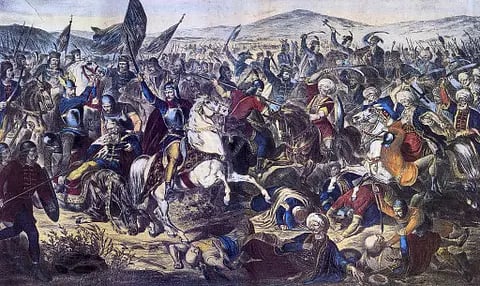Battle of Kosovo 1389: Ottoman-Serbian Clash & Lasting Legacy
Explore the Battle of Kosovo 1389: Prince Lazar vs. Sultan Murad. Discover the historic clash’s outcome, cultural impact, and why it shaped Balkan history.


The Battle of Kosovo 1389: A Turning Point in Medieval Balkan History
The Battle of Kosovo 1389 remains one of the most pivotal clashes in medieval European history, pitting the Serbian Prince Lazar against the expanding Ottoman Empire led by Sultan Murad I. Fought on the Kosovo Polje (Field of Blackbirds), this conflict symbolizes bravery, sacrifice, and the enduring struggle for freedom in Balkan lore.
Historical Context: Rising Tensions in the Balkans
By the late 14th century, the Ottoman Empire had advanced deep into Southeastern Europe, threatening Christian kingdoms. Serbia, under Prince Lazar Hrebeljanović, emerged as a key defender of the region. The battle was not just a military confrontation but a collision of cultures, religions, and imperial ambitions.
Key Figures: Heroes and Strategists
Prince Lazar of Serbia: Revered as a martyr, Lazar united Serbian nobles and a coalition of Balkan allies to resist Ottoman dominance.
Sultan Murad I: The Ottoman leader sought to consolidate control over the Balkans, leveraging superior numbers and tactical prowess.
The Battle of Kosovo: A Day of Blood and Legend
On June 28, 1389, the two forces clashed at Kosovo Polje. Historical accounts suggest heavy casualties on both sides, including the deaths of Sultan Murad I (reportedly assassinated by Serbian knight Miloš Obilić) and Prince Lazar, who was captured and executed. Though the battle ended in a stalemate, the Ottomans eventually gained the upper hand, weakening Serbian resistance and paving the way for Ottoman dominance in the region.
Aftermath and Legacy
The Battle of Kosovo 1389 left a profound cultural imprint. For Serbs, it became a symbol of national identity and sacrifice, immortalized in epic poetry and Orthodox Christian traditions. The Ottomans, despite losing their sultan, continued their expansion, annexing Serbia by 1459.
Modern Significance: Why Kosovo 1389 Matters Today
The battle’s legacy fuels historical debates and national narratives in the Balkans. Kosovo Polje is a pilgrimage site, and the conflict is often invoked in discussions about Balkan unity and identity.
FAQs About the Battle of Kosovo 1389
Q: Who won the Battle of Kosovo in 1389?
A: Both sides suffered heavy losses, but the Ottomans eventually capitalized on the power vacuum, making it a strategic long-term victory.
Q: Why is the Battle of Kosovo important?
A: It halted Ottoman expansion temporarily and became a cornerstone of Serbian cultural pride and Orthodox Christian heritage.
Q: Where was the Battle of Kosovo fought?
A: The clash occurred at Kosovo Polje, near modern-day Pristina.
